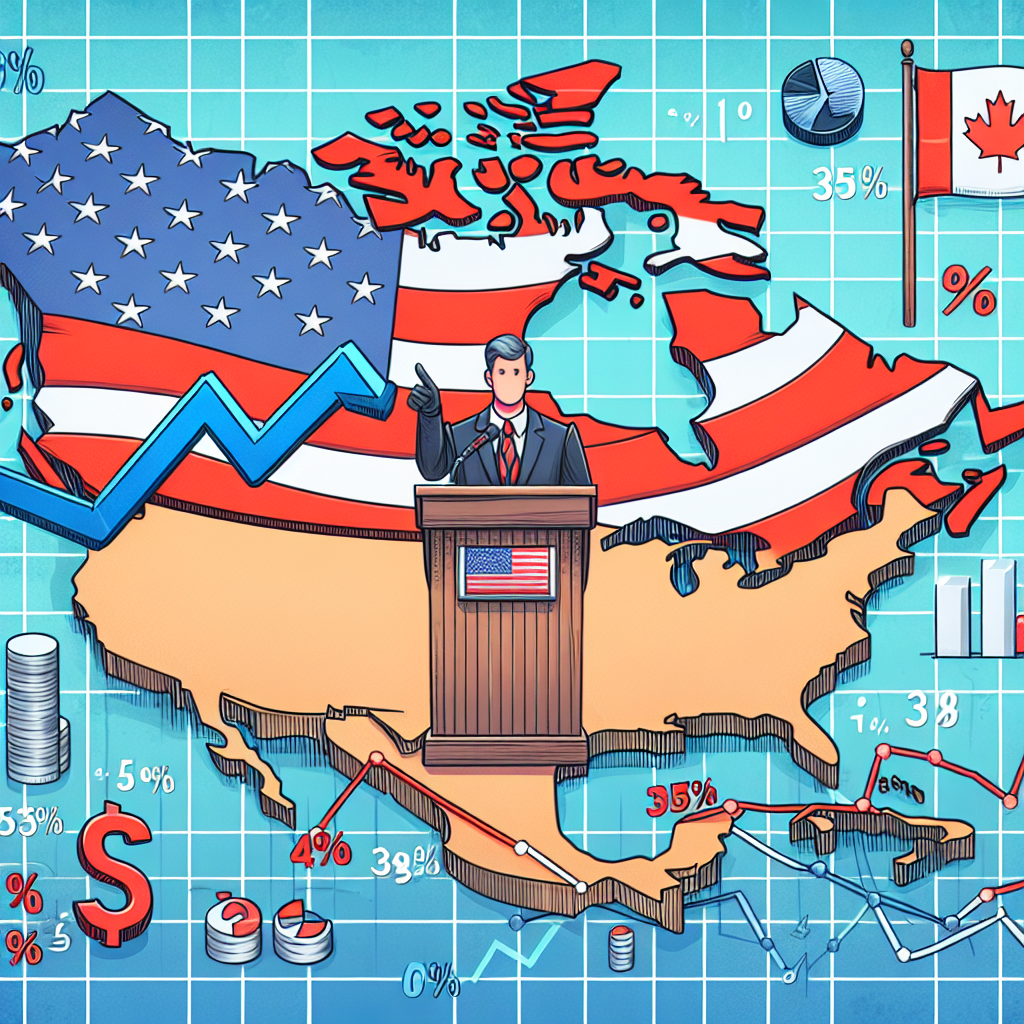Market Rattled as U.S. Slaps 35% Tariff on Canadian Imports
In a surprise move that sent shockwaves through global markets, former President Donald Trump has announced a sweeping 35% trade tariff on Canadian goods. The announcement caused U.S. stock index futures to decline sharply, reflecting investor concerns about escalating trade tensions between the two neighboring economies.
Immediate Market Response
Following Trump’s announcement, U.S. stock index futures fell across the board. Dow Jones Industrial Average futures dropped over 200 points in pre-market trading, while S&P 500 and Nasdaq futures also posted notable declines. The markets are reacting to both the economic implications of strained U.S.-Canada trade relations and heightened geopolitical uncertainty.
Major Index Losses Include:
- Dow Jones Industrial Average Futures: Down 0.6%
- S&P 500 Futures: Down 0.5%
- Nasdaq Futures: Down 0.4%
Details of the Tariff Announcement
Trump made the announcement during a conference, stating the tariff would cover a broad range of Canadian imports—from automotive products to aluminum and agricultural goods. He justified the move by accusing Canada of “unfair trade practices” and expressed a desire to protect U.S. manufacturing jobs.
“This is about economic patriotism. We’ve let Canada take advantage of us for too long,” Trump was quoted as saying.
The decision follows months of rising rhetoric from Trump over renegotiating trade agreements and securing more favorable terms for American industries.
Impact on U.S.-Canada Trade Relations
Canada is America’s second-largest trading partner, with hundreds of billions of dollars in goods and services exchanged annually. A unilateral tariff of this scale could significantly alter that relationship. Canadian officials were quick to respond, calling the tariffs “illegal under international trade law” and vowing retaliation.
Key sectors likely to feel the pinch include:
- Automotive Industry: With cross-border integration in auto manufacturing, tariffs could disrupt supply chains and inflate vehicle costs.
- Agriculture: U.S. farmers may face lost export opportunities if Canada imposes counter-tariffs on American produce.
- Raw Materials: Industries reliant on Canadian aluminum and lumber may see input costs soar.
Investor Concerns Grow
Financial analysts warn that the tariff could trigger a tit-for-tat trade war, adding unnecessary risk to a market already contending with inflationary pressures and uncertain Fed policy. Analysts also point to historical parallels with past trade disputes that have weighed heavily on financial markets.
According to Liz Ann Sonders, Chief Investment Strategist at Charles Schwab:
“This introduces a new layer of unpredictability. Any disruption to the North American trade corridor will be felt keenly across multiple sectors of the U.S. economy.”
Corporate America Reacts
Companies with substantial cross-border operations are already voicing concerns. Automakers like General Motors and Ford—both of which rely heavily on components imported from Canadian suppliers—have seen their share prices dip in after-hours trading.
Other corporations likely to be affected include:
- Boeing, which sources aircraft materials from Canada.
- Caterpillar, due to its international supply chains reliant on North American integration.
- Kraft Heinz, which markets several Canadian-made food products across the U.S.
Political Ramifications Ahead of Election Season
Trump’s announcement comes amid growing speculation about his intentions for the 2024 presidential race. Some political analysts view the tariff as a strategic move to appeal to his base, particularly in key manufacturing states like Michigan, Ohio, and Pennsylvania.
However, the move is also politically risky. Economic fallout from a trade war with Canada could dampen consumer sentiment and hurt businesses already grappling with high costs and labor shortages.
Looking Ahead: Risks and Opportunities
As markets digest the impact of the newly imposed tariffs, investors will be closely watching for statements from the Federal Reserve, the White House, and Canadian officials. Any signs of escalating retaliation or diplomatic deadlock could intensify market volatility in the days ahead.
What to Watch:
- Canada’s official response and potential retaliatory tariffs.
- Future policy signals from Trump’s team and Republican allies.
- Currency fluctuations, especially the U.S. Dollar and Canadian Loonie.
- Corporate earnings reports detailing tariff impact guidance.
Conclusion
Trump’s imposition of a 35% tariff on Canadian imports adds a new layer of uncertainty to the global market landscape. With stock index futures reacting negatively and companies bracing for further disruption, investors and policymakers alike are navigating treacherous terrain. As this story develops, all eyes will be on bilateral negotiations and the wider economic implications of this bold trade maneuver.



Leave a Reply